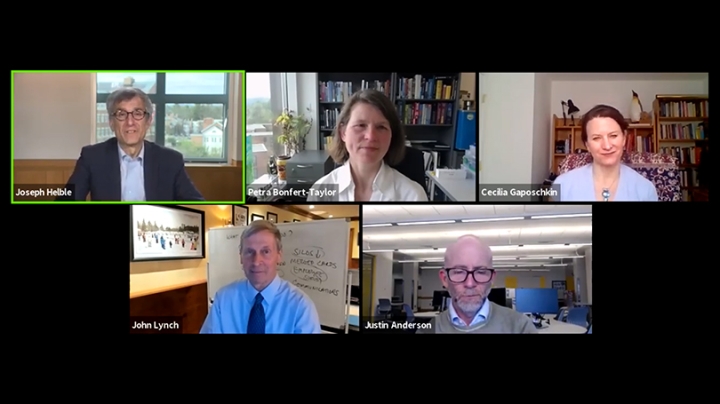Students in Professor of History Cecilia Gaposchkin’s first-year seminar on Joan of Arc are writing a book together—remotely. In Professor of Engineering Petra Bonfert-Taylor’s scientific computing class, students are writing programs—in Zoom breakout sessions. Second-year Tuck students are questioning CEO guests—online—in former N.H. governor and Clinical Professor of Business John Lynch’s course on the CEO experience.
What faculty have done in a short time under difficult circumstances is remarkable, said Provost Joseph Helble.
In this week’s Community Conversations broadcast—a weekly online forum for members of the Dartmouth community to ask questions and get updates from campus leaders about the institution’s priorities, decisions, and operations during the COVID-19 pandemic—Helble spoke with Gaposchkin, Bonfert-Taylor, and Lynch about how they and their students are adapting to teaching and learning remotely this term.
The three professors gave viewers a window into the creativity and resilience being demonstrated by Dartmouth faculty, students, and staff throughout the institution during the COVID-19 crisis.
“In total, 94 percent of our scheduled classes have been offered as planned … 884 by my count across the campus—a transformation that happened in two weeks’ time, from the point where we decided that spring term would be remote learning to the point where the term opened,” Helble said. “This is an incredible commitment of our faculty and our staff to offering our students quality educational continuity.”
Helble began Wednesday’s session with an update on several ongoing issues, including the process by which student belongings left on campus at the end of winter term will be returned to their owners (he expects an announcement on this process by the end of next week); summer-term grading and the possibility of an expanded non-recording option for summer remote courses; the June virtual ceremony in which degrees will be conferred; plans to ramp up research on campus over the course of the summer; and the process for determining how many students, faculty, and staff may be able to safely return to campus for the coming fall term, which will likely be a combination of remote and residential learning.
The core principles guiding these and other critical decisions are “first and foremost, community in the broadest possible sense—health and safety guiding everything that we do,” Helble said. “And second, educational continuity for our community and particularly for our students in both research and teaching, undergraduate and graduate.”
He addressed the financial losses that have led to wage and hiring freezes across the institution. “I won’t sugarcoat this: The challenge that we face is not just the immediate, but it’s the uncertainty that lies ahead of us in the next fiscal year and beyond.”
Helble took questions from viewers on several of these issues, in a discussion moderated by Vice President for Communications Justin Anderson, who spoke from a room adjacent to Starr Studio, where Helble was located.
Gaposchkin, Bonfert-Taylor, and Lynch joined Helble via Zoom from other locations. Each spoke about the challenges of remote teaching—and what they’ve learned in the process.
Gaposchkin said she had wanted to try a group writing project in her Joan of Arc class for a long time, and the circumstances of this spring term have given her and her students the freedom to experiment.
“My core goal for this term for the students was that they had a good learning experience,” she said. “And I am learning so much about how to run this project.”
Bonfert-Taylor spoke about how Thayer faculty and students are continuing lab- and project-based work remotely.
“We’re bringing the labs to the students rather than the students to the labs,” she said. In the four days before the start of spring term, 300 packages with specialized equipment, including items such as 3D printers and digital oscilloscopes, were sent to students’ homes.
Asked how he is incorporating the lessons of COVID-19 into his leadership course, Lynch said he tells students that “they will face some kind of a crisis, whether they’re working in the public sector or private sector. And many if not all of the qualities we are discussing in our cases will be applicable to these crises—and are applicable to how the coronavirus is being managed.”
Helble said that while faculty are working remotely, they are continuing with research, doing data analysis, and writing scholarly manuscripts and grant proposals.
“Are we closed to research? When I’m asked that question, the answer is emphatically no,” he said. “The research activity at its fundamental core has been continued.”
On-campus research will be “gradual, controlled, and measured” over the summer, he said, with a working group developing plans for bringing researchers back to campus, and essential lab work done in an environment with strict protocols in place.
Strict measures will also be in place when some number of students return to campus, he said. But before students can come back to Hanover, Helble said, senior leaders will receive guidance from a new health care working group, and other health professionals, on how many students can be safely accommodated, and will map that number against curriculum scheduling.
“As you might imagine, that is an extraordinarily complicated and difficult process and difficult decision to make.”
Community Conversations will air Wednesdays at 3:30 p.m. through spring term. The first episode is available on the Community Conversations site, which includes call-in numbers for those who want to listen to the show without video. Find out how to watch or listen to the broadcast and send in questions during the show.
Community Conversations is produced by Dartmouth’s Media Production Group and the Office of Communications. The show is broadcast from MPG’s Starr Studio in the Dartmouth Library’s Baker-Berry Library.
For the latest information on Dartmouth’s response to the pandemic visit the COVID-19 website.
Hannah Silverstein can be reached at hannah.silverstein@dartmouth.edu.


